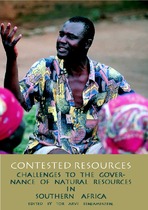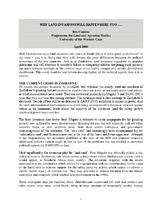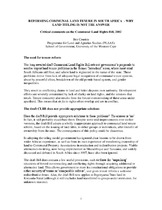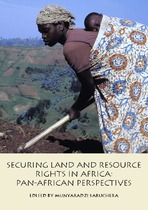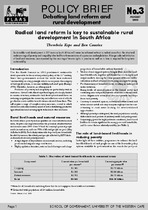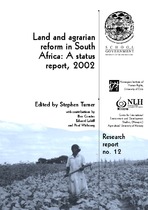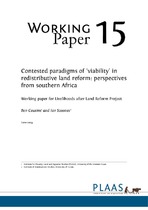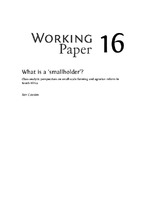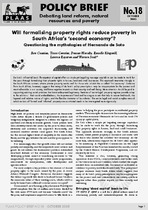Search
Now showing items 1-10 of 13
Contested resources: Challenges to the governance of natural resources in Southern Africa
(Institute for Poverty, Land and Agrarian Studies, University of the Western Cape, 2002)
In this keynote address I wish to identify some
important ideas and conclusions arising out of recent
analyses of theory and practice on natural resource
management. I use these in a preliminary attempt to
argue that ...
Why land invasions will happen here too .....
(Institute for Poverty Land and Agrarian Studies (PLAAS), 2000)
Will Zimbabwean-style land invasions take place in South Africa at some point in the future? In my view – yes, it is likely that they will, despite the great differences between the political economies of the two countries. ...
Reforming communal land tenure in South Africa – why land titling is not the answer: Critical comments on the communal land rights bill, 2002
(Institute for Poverty Land and Agrarian Studies (PLAAS), 2002)
The long-awaited draft Communal Land Rights Bill sets out government’s proposals to resolve urgent land tenure problems in the former ‘homeland’ areas, where most rural South Africans still live, and where land is registered ...
Securing land and resource rights in Africa: Pan-African perspectives
(Institute for Poverty, Land and Agrarian Studies, University of the Western Cape, 2004)
Across the African continent the land and resource rights
of the rural poor are threatened by inappropriate policies
and institutions (including global treaties); unequal social,
political and economic relations; the ...
Radical land reform is key to sustainable rural development in South Africa
(Institute for Poverty, Land and Agrarian Studies, University of the Western Cape, 2002)
Sustainable rural development in 21st century South Africa will never be achieved without a radical assault on the structural
underpinnings of poverty and inequality inherited from three centuries of oppression and ...
Land and agrarian reform in South Africa: A status report, 2002
(Institute for Poverty, Land and Agrarian Studies, University of the Western Cape, 2002)
In 1994, South Africa started a new life as a democratic nation. It
faced immense challenges. Multiple economic, social and political
transformations were needed to overcome the legacy of colonialism and
apartheid. The ...
Reforming communal land tenure in South Africa – Why land titling is not the answer
(Institute for Poverty, Land and Agrarian Studies, University of the Western Cape, 2002)
The long-awaited draft Communal Land Rights Bill sets out government’s proposals to
resolve urgent land tenure problems in the former ‘homeland’ areas, where most rural
South Africans still live, and where land is ...
Contested paradigms of ‘viability’ in redistributive land reform: perspectives from southern Africa
(Institute for Poverty, Land and Agrarian Studies, University of the Western Cape, 2009-06)
‘Viability’ is a key term in debates about land reform in southern African and beyond, and is used in relation to both individual projects and programmes. ‘Viability’ connotes ‘successful’ and ‘sustainable’ - but what is ...
What is a ‘smallholder’? Class-analytic perspectives on small-scale farming and agrarian reform in South Africa
(Institute for Poverty, Land and Agrarian Studies, University of the Western Cape, 2009)
It is often argued that the primary beneficiaries of land reform in South Africa should be ‘the rural poor’ and ‘smallholders’, rather than ‘emerging commercial farmers’. The term ‘smallholder’ is problematic, however, ...
Will formalising property rights reduce poverty in South Africa’s ‘second economy’?
(Institute for Poverty, Land and Agrarian Studies, University of the Western Cape, 2005)
De Soto’s influential book The mystery of capital offers a simple yet beguiling message: capitalism can be made to work for
the poor, through formalising their property rights in houses, land and small businesses. This ...

